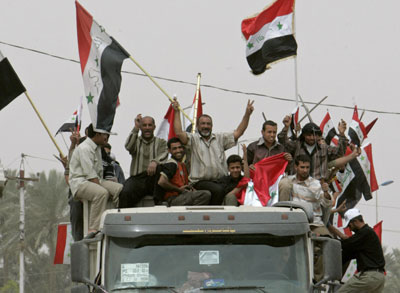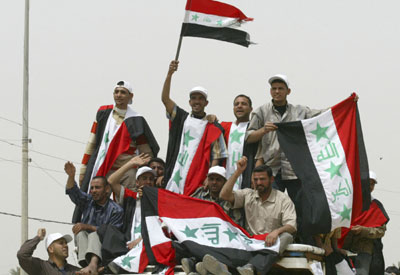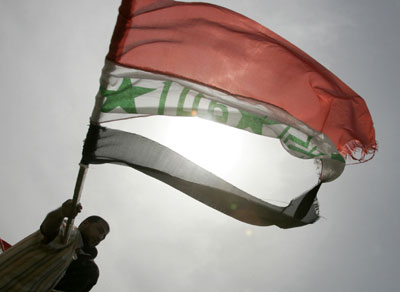Slideshow
Iraqis flock to city for anti-US protest
(Reuters)
Updated: 2007-04-09 09:35
 |
Large Medium Small |
|
|
Thousands of Iraqis streamed to the holy southern city of Najaf on Sunday in response to a call by fiery Shi'ite cleric Moqtada al-Sadr for a big anti-American protest on Monday.
Sadr, who blames the U.S.-led invasion for Iraq's unrelenting violence, has urged Iraqis to protest on the fourth anniversary of the day American forces swept into central Baghdad.
"In order to end the occupation, you will go out and demonstrate," Sadr, who accuses U.S. forces of deliberately fomenting civil strife in Iraq, said in a statement.
Four American soldiers were killed in attacks south of Baghdad on Sunday while another two died from wounds suffered in operations north of the capital, the U.S. military said.
The toll makes it a deadly weekend for American troops after four soldiers were killed in an explosion near their vehicle in Diyala province north of Baghdad on Saturday.
A car bomb killed 17 people and wounded two dozen in the town of Mahmudiya south of Baghdad, officials said, in the latest attack outside Baghdad since a new U.S.-backed security plan took effect in the capital.
A suicide car bomb also killed seven people in Baghdad.
|
|
Sadr, who has been keeping a low profile, called on his Mehdi Army militia and Iraqi security forces to stop fighting in the volatile city of Diwaniya and stop playing into the hands of U.S. forces who he said had stirred up civil strife.
Iraqi and U.S. forces have clashed with militiamen in Diwaniya since launching an operation on Friday to wrest control of the southern city from the Mehdi Army. The Pentagon says the militia is the greatest threat to peace in Iraq.
Brigadier Qassim Moussawi, spokesman for a U.S.-Iraqi security operation in Baghdad, said a 24-hour vehicle ban would be in force in the capital from 5 a.m. (0100 GMT) on Monday.
"There will be protests marking the fourth anniversary. We don't want to give the terrorists a chance to use this opportunity," Moussawi said.
The mayor of Mahmudiya, Muaid al-Amiri, said the car bomb killed 17 people in the town, 30 km (20 miles) south of Baghdad.
It targeted industrial workshops and largely destroyed a three-storey building. Many smaller shops were levelled.
"Three of us and a young boy were sitting in a store selling spare parts for cars when there was a huge explosion. Debris from the roof fell on me," said a wounded man who gave his name as Sadeq, lying on a hospital bed in the town.
PAPAL LAMENT
What largely began as a Sunni Arab insurgency against U.S. and Iraqi forces following the 2003 invasion of Iraq has since been transformed into a bloody sectarian conflict between Shi'ites and once-dominant Sunni Arabs.
Tens of thousands of Iraqis have been killed in the past year alone. More than 3,270 American soldiers have been killed since the U.S.-led invasion.
Pope Benedict, in his Easter message, lamented the conflict. "Nothing positive comes from Iraq, torn apart by continual slaughter as the civil population flees," he said.
Thousands of Shi'ites rode buses or cars to Najaf on Sunday, responding to Sadr's call.
The Baghdad-Najaf road was packed with hundreds of vehicles crammed with passengers waving Iraqi flags and chanting religious and anti-U.S. slogans.
"No, no, no to America ... Moqtada, yes, yes, yes," they chanted as they converged on the holy city.
Witnesses in some southern towns said Iraqi police were trying to stop Sadr's supporters from getting to Najaf.
The U.S. military says Sadr, who is wildly popular among Iraq's urban Shi'ite poor, is in neighboring Iran. His aides insist the young cleric is in Iraq and have denied suggestions he fled to Iran to escape the crackdown.
| 分享按钮 |


